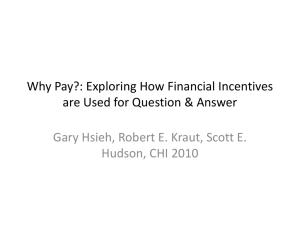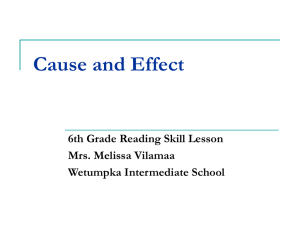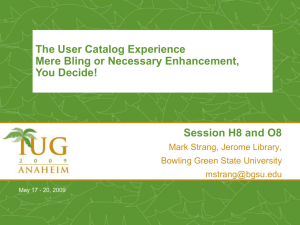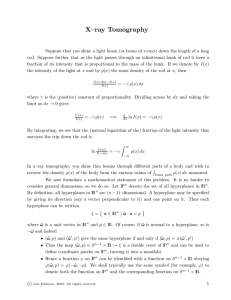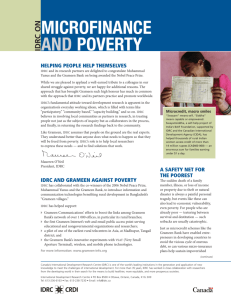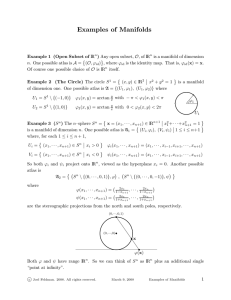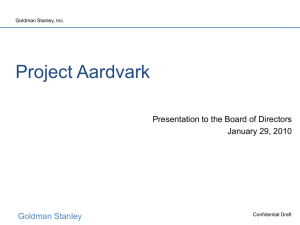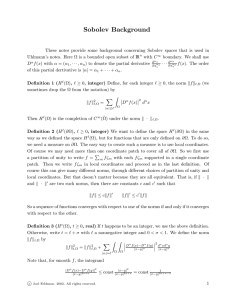February / March 2010
advertisement
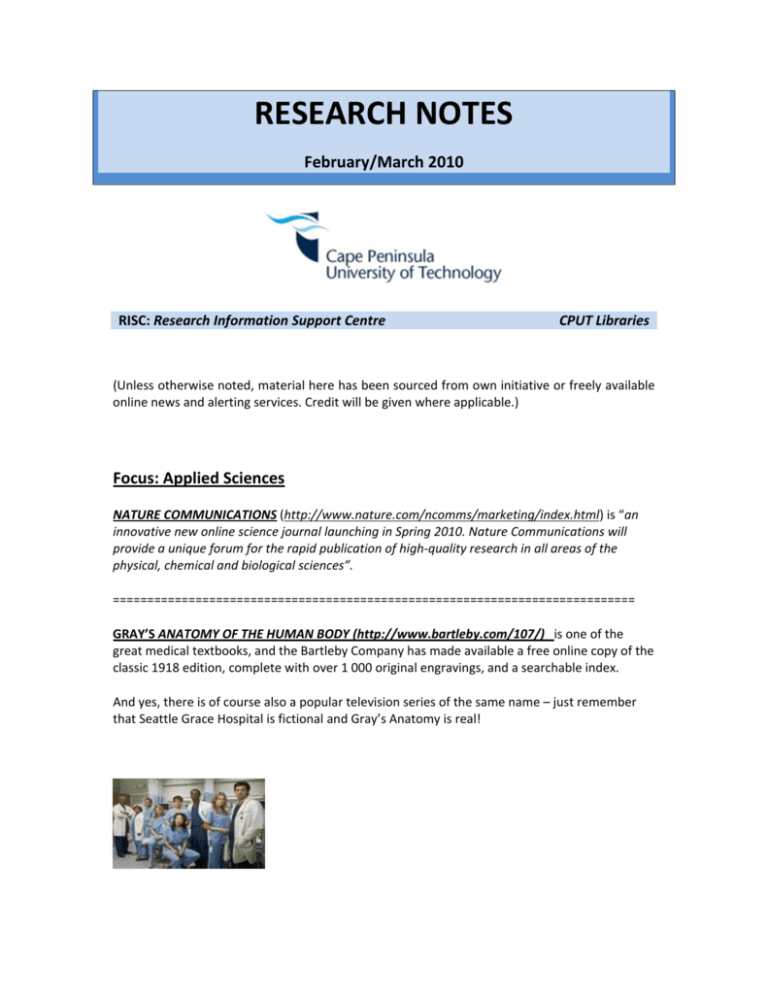
RESEARCH NOTES February/March 2010 RISC: Research Information Support Centre CPUT Libraries (Unless otherwise noted, material here has been sourced from own initiative or freely available online news and alerting services. Credit will be given where applicable.) Focus: Applied Sciences NATURE COMMUNICATIONS (http://www.nature.com/ncomms/marketing/index.html) is “an innovative new online science journal launching in Spring 2010. Nature Communications will provide a unique forum for the rapid publication of high‐quality research in all areas of the physical, chemical and biological sciences”. ============================================================================ GRAY’S ANATOMY OF THE HUMAN BODY (http://www.bartleby.com/107/) is one of the great medical textbooks, and the Bartleby Company has made available a free online copy of the classic 1918 edition, complete with over 1 000 original engravings, and a searchable index. And yes, there is of course also a popular television series of the same name – just remember that Seattle Grace Hospital is fictional and Gray’s Anatomy is real! ANATOMY TEXTBOOKS AND ATLASES (http://www.anatomyatlases.org/) are offered as part of the excellent University of Iowa College of Medicine Virtual Hospital service. ============================================================================== Focus: General OAISTER now available at FirstSearch’s ArticleFirst (OCLC) on Library database (http://www.cput.ac.za/library_2/databases.php). The last issue of “Research Notes” noted that the University of Michigan has handed over the excellent Oaister database/resource (which they owned and managed), to OCLC. The resource is thus (temporarily) available by subscription only ‐ although also embedded in WorldCat ‐ and has been incorporated, inter alia, in OCLC’s ArticleFirst database, to which we do have a subscription, luckily enough. Access to the database is via Sabinet – see “Firstsearch” under F in the database list. OCLC has announced their intent to make Oaister content freely available in 2010. ============================================================================== Focus: Social networking LINKEDin (http://za.linkedin.com/) ‐ for those still unfamiliar with the service! ‐ is an online network of professional persons who use the facility to interact with trusted peers, to search for and find employment, and to share knowledge. Although the membership profile is business orientated, many academics have also joined the network. ============================================================================== INTERNET RESOURCES NEWSLETTER (http://www.hw.ac.uk/libWWW/irn/ ) The Internet Resources Newsletter (IRN) that brilliant and indispensible service alerting users to new resources online, produced and co‐edited by Roddy MacLeod at Heriot‐Watt University in Edinburgh, is no more. This news leaves one feeling very sad and bereft, as this eagerly awaited monthly newsletter somehow managed to unearth the most intriguing and useful material. The final issue, Number 178, was released in December 2009. Research Notes would never have seen the light of day had it not been for IRN. The Internet Resources Newsletter began publication in October 1994, and Roddy MacLeod retired in December 2009 after 34 years as an academic librarian. ============================================================================== AARDVARK (http://vark.com/) is a social search facility constructed by a start‐up company located in San Francisco. Although not a new concept, this is the first such tool available online. (Note that this is NOT the local search engine located at www.aardvark.co.za ) The facility works via (your) network of friends, so synchronization with a Facebook account is recommended. Heavily oriented to American users, and still in its infancy, the tool is of limited use, and not really effective as an academic research aid. Nevertheless it does have potential and bears watching. Also see the paper on Aardvark presented at the WWW 2010 conference: Breaking news: it was announced on 12 February 2010 that Google had bought Aardvark for an undisclosed amount. Click here for more information ============================================================================== Focus: General GRADUATE ATTRIBUTES is a baseline study on South African graduates from the perspective of employers, released in January 2009 for HESA (Higher Education South Africa) and SAQA (South African Qualifications Authority). Click here for the Graduate Attributes: A baseline study on South African graduates from the perspective of employers AUSESEARCH (http://www.google.com/cse/home?cx=012189697858739272261:yyyqychcumo) is identical to our own IR Search – a search facility covering all (in this case) Australian institutional repositories containing academic content. Google Custom Search has been used to build the facility. ============================================================================== The INTERNET ARCHIVE (http://www.archive.org/ ) is an important project. While at first glance it may appear to be yet another frivolous American indulgence, the storing/archiving of historical digital material is of course crucial. The Archive is an open access, non‐profit operation, founded in 1996 and located in San Francisco. Holdings include text, audio, images, software and web pages. Although this resource is placed under the heading “General”, it is probably the Faculty of Informatics and Design which would find it most useful. ============================================================================== Focus: Informatics MOBILE ACCESS TO INFORMATION (www.resourceshelf.com/wpcontent/uploads/2009/09/mobile‐2009.html) One of the original Internet information experts, Gary Price, has produced this guide to information finding via mobile access. The document is crammed full of interesting and useful links. (Credit:Resourceshelf) ============================================================================== HOW GOOGLE BEGAN (http://infolab.stanford.edu/~backrub/google.html ) The original Google paper by Brin and Page at Stanford has been featured on Research Notes before, but merits inclusion again as it is just so instructive and inspirational! Focus: Applied Sciences (and Engineering) CERN DOCUMENT SERVER (http://cdsweb.cern.ch/)_ this is a great resource for those working in the field of particle physics and related areas. Produced at the European Organisation for Nuclear Research in Switzerland. ============================================================================== SCIENCEWATCH (http://sciencewatch.com/) On this Thompson Reuters product, one can “view selected overall and field rankings, pertinent statistics on the principles behind the data, the latest version of the database, including new entrants and ‘Rising Stars’ in the rankings, information on field definitions, citation thresholds, and graphing trends”. The material is taken from Essential Science Indicators and other services. ============================================================================== INFORMATION RESEARCH (http://informationr.net/ir/index.html ) is an Open Access journal published by Prof. Tim Wilson of Sheffield and supported by Lund University Libraries, Sweden. The contents include the results of research across a wide range of information‐related fields. ============================================================================== The INTERNATIONAL DEVELOPMENT RESEARCH CENTRE (IDRC) (http://www.idrc.ca/index_en.html ) is a Canadian government enterprise (Crown Corporation) which for decades has supported and worked with researchers from the developing world. The IDRC works in four main thrusts: Social and Economic Policy Innovation, Policy and Science Information and Communication Technologies for development Environment and Natural Resources Management A mass of information is made available via thematic websites, multimedia, online documentation, journals and books. ============================================================================== IPL2 (http://www.ipl.org/) or the Internet Public Library 2 is the entity resulting from the merger of the Internet Public Library and the Librarians’ Internet Index. The new resource went live online in January 2010. Although possibly suited more to the general public and school or first year tertiary students rather than intensive academic use, IPL2 is nevertheless an important resource. It is hosted at Drexel University, supported by nine US universities and sponsored by Intel and Sun Microsystems’ and therefore it has an obvious North American focus. ==============================================================================




